Harmonizing Innovation: AI’s Role in Shaping the Future of Music Product
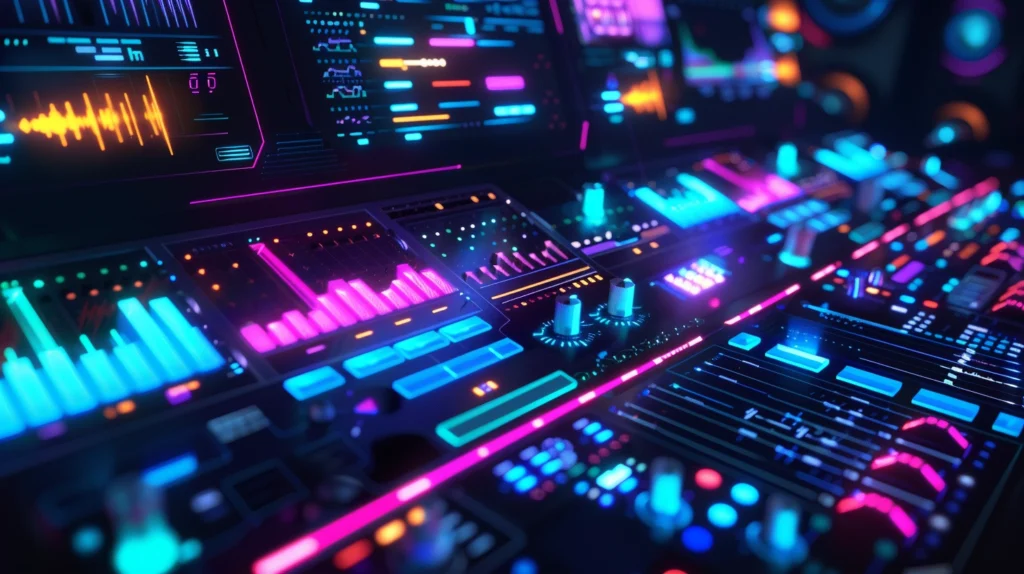
The music industry has traditionally been limited by the human capacity to analyze data and innovate in sound, making it challenging to push the boundaries of music production.
Despite the talent and creativity in the industry, there’s a barrier to maximizing the potential of musical innovation due to these limitations, resulting in a slow evolution of music production techniques.
Artificial Intelligence (AI) is revolutionizing the music industry, transforming every aspect of music creation, generation, and innovation. By analyzing vast amounts of data and learning from patterns, AI is reshaping the creative process and offering new opportunities to push the boundaries of music production. This article explores the profound impact and opportunities of AI for music production.
Key Takeaways
Craft the future of music with AI.
Customize this prompt with your artist or producer name to explore groundbreaking AI applications in music production.
AI in music production is shaping the future of how music is composed, produced, and experienced. By integrating artificial intelligence into music creation processes, artists and producers can explore new soundscapes, automate tedious aspects of production, and personalize music experiences for listeners. AI technologies like machine learning algorithms, neural networks, and natural language processing are enabling these advancements, pushing the boundaries of creativity and innovation in music. Here’s a customizable prompt to delve into the role of AI in revolutionizing music production:
### Customizable Prompt for Exploring AI in Music Production
"How can [Music Producer/Artist Name], aiming to innovate and expand their musical horizons, incorporate AI technologies into their music production process to create unique soundscapes, enhance composition techniques, and offer personalized experiences to [Target Audience]? Consider the integration of AI for melody generation, rhythm creation, sound design, and dynamic music experiences."
#### Areas to Explore:
1. **AI-Driven Composition Tools**: How can AI be used to assist in generating melodies, harmonies, and rhythms, providing [Music Producer/Artist Name] with a broad palette of musical ideas and inspirations?
2. **Sound Design and Audio Processing**: Explore the potential of AI in transforming sound design, enabling the creation of new instruments and sounds that were previously unimaginable, and automating aspects of audio processing and mixing.
3. **Lyric Generation and Vocal Processing**: Discuss how AI can contribute to lyric writing processes and vocal enhancements, using natural language processing to create meaningful lyrics and altering vocal tracks in innovative ways.
4. **Personalized Music Experiences**: How can [Music Producer/Artist Name] leverage AI to create dynamic and adaptive music experiences for listeners, where tracks can evolve based on listener preferences or environmental factors?
5. **Collaboration Between AI and Artists**: Explore the collaborative potential between AI and human creativity, identifying ways in which AI can serve as a creative partner to push the boundaries of traditional music production.
6. **Ethical Considerations and Authenticity**: Discuss the ethical implications of using AI in music production, including concerns about originality, copyright, and the future role of human musicians in an AI-dominated landscape.
### Guide for Use:
- Personalize the prompt by specifying your role (music producer, artist) and detailing your target audience or specific musical goals.
- Use the insights generated to identify which AI technologies and tools can best complement your creative process and musical objectives.
- Consider experimenting with different AI music production tools and software to find the ones that align with your creative style and production needs.
- Engage with the music production community to share experiences, insights, and ethical considerations regarding the use of AI in music creation.
AI's role in music production heralds a new age of artistic expression, enabling creators to explore uncharted territories of sound and composition. As these technologies continue to evolve, so too will the ways in which music is created, experienced, and shared, promising a future rich with new musical possibilities.How AI for Music Production Revolutionizes the Industry
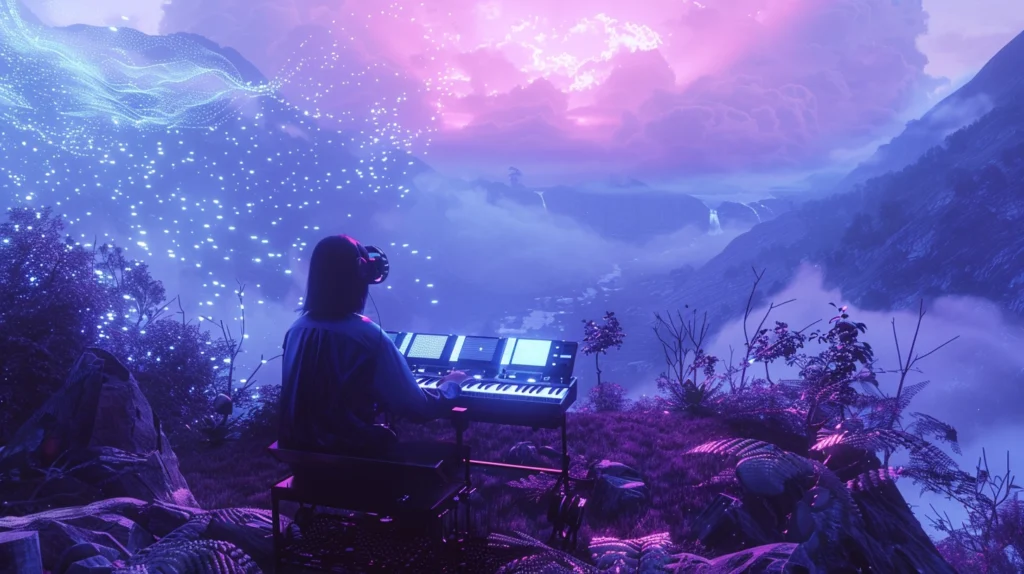
AI in Modern Music Production
In the rapidly evolving world of music production, artificial intelligence (AI) has emerged as a groundbreaking force, seamlessly integrating into the creative process. Modern music production leverages AI to generate new music, offering tools that can create complex compositions and even perform tasks traditionally done by human producers. From voiceovers for YouTube content to immersive soundscapes for game development, AI’s versatility is reshaping how creators approach music creation.
AI tools for music production, such as Amper Music and Ecrett Music, simplify the process, enabling producers to make music that ranges from backing tracks for videos to complete musical pieces for commercial release. These tools use machine learning algorithms to analyze vast datasets of existing music, learning from them to compose original music. This not only speeds up the music composition process but also democratizes music production, making it accessible to creators without formal musical training.
AI Evolution in Music Creation
The evolution of AI in music creation is marked by significant advancements in AI music composition and generation technologies. Initially, AI was utilized to mimic simple melodies and harmonies. Today, sophisticated AI models and neural networks have the capability to generate new music that’s indistinguishable from compositions created by human composers.
One of the most significant advancements has been in the use of AI algorithms to create music that’s not only original but also emotionally resonant with listeners. For instance, AI-generated music now increasingly features in film scores, advertising, and even as standalone pieces enjoyed by audiences seeking new music.
Music industry leaders are increasingly recognizing the potential of AI for music production. AI music composers and generators are now being used to experiment with new music-based formats and genres, pushing the boundaries of traditional music composition. This technological progress represents a symbiotic relationship between AI and human creativity, where AI’s music generation capabilities are matched with the nuanced artistic direction of human composers.
By harnessing AI tools, producers and composers are revealing new opportunities in music production, continually enhancing the richness and diversity of the music world. AI technology in music doesn’t replace the human touch; instead, it complements it, enabling artists to explore uncharted territories in music creation. As AI in music composition continues to evolve, it’s clear that the future of music will be a harmonious blend of technology and human creativity, generating an exciting array of original music for generations to come.
The Current Landscape of AI Tools in Music Production
AI Tools for Music Producers
The integration of AI in music composition has transformed the music industry, offering an array of tools designed for every stage of music production. AI tools for music production have become indispensable for composers, enabling them to generate new music and create original compositions with unparalleled efficiency. Tools like Amper Music and Ecrett Music stand out for their ability to produce royalty-free music tracks tailored for various uses like content creation, YouTube, and game development.
- Amper Music: Utilizes AI algorithms to help users compose and produce original music without needing extensive music theory knowledge.
- Ecrett Music: Allows for the creation of custom soundtracks, harnessing AI to adapt to different moods and settings.
These innovations not only speed up the music creation process but also democratize music production, making it more accessible to individuals without formal training in music composition.
AI’s Revolution in Music Creation
AI’s role in the music creation process is nothing short of revolutionary. By harnessing machine learning and neural networks, AI can analyze existing music data, learning from it to generate new music that ranges from symphonies to pop songs. The result is AI-generated music that often mirrors the emotional depth and complexity of compositions created by human composers.
- AI music generators use artificial intelligence to produce melodies, harmonies, and rhythms.
- AI models in music suggest chords, compose melodies, and even create music based on specific emotions or themes.
Music generation through AI is not about replacing human composers but augmenting their creativity. It allows composers to explore new musical territories, experimenting with styles and structures that might be beyond their manual capabilities. AI in music production serves as a co-creator, offering tools that can generate music based on given parameters but leaving room for human intervention and final touches.
As AI technology evolves, so too does its application in music composition. Music industry professionals are increasingly using AI to not just generate new music but also adapt and enhance existing music, creating original compositions that resonate with a wide audience. Through this synergy, music enriched by AI continues to evolve, pushing the boundaries of what’s creatively possible in the area of music production.
Adoption Rates and Producer Sentiments
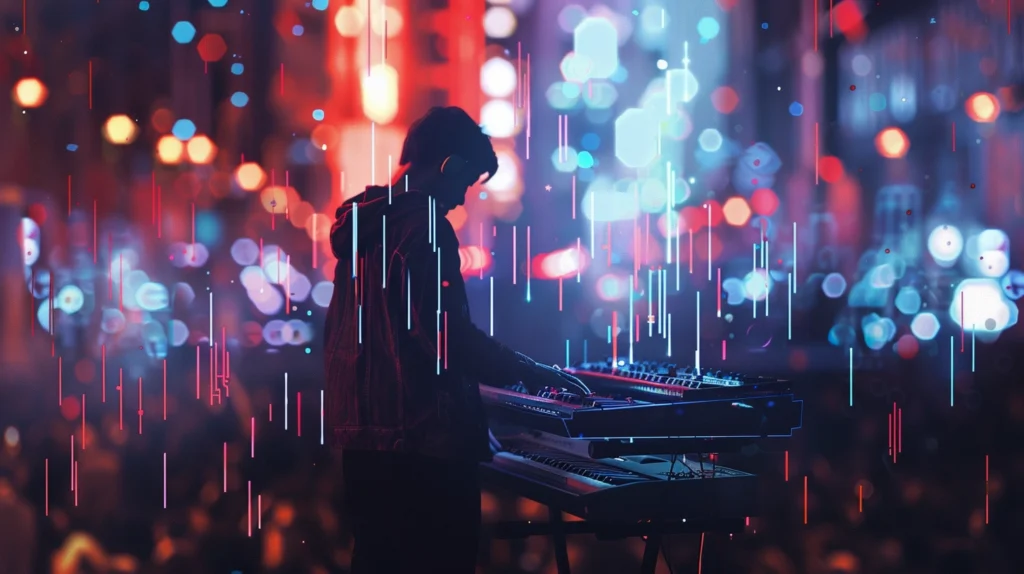
AI Adoption by Music Producers
The integration of AI in music production has seen a notable uptick, transforming how music is composed, produced, and even conceptualized. Data highlights a significant adoption among music producers, with 60% already leveraging AI for various aspects of music creation, from mastering and artwork generation to music composition. This utilization underscores the shifting paradigm in the music industry towards more technologically advanced methods of content creation.
A closer examination reveals that 36.8% of surveyed music producers are incorporating AI tools into their production workflows, a figure that is complemented by the 30.1% poised to explore AI capabilities in the near future. This trend is not just limited to creating new music or enhancing existing tracks but extends to operational efficiencies such as mixing and mastering, where 28.66% of producers use AI tools.
Here are additional insights into AI’s adoption in music production:
- AI Tools Utilization: AI mixing and mastering tools are currently the most popular among producers.
- Future Adoption Plans: 30.1% of producers plan to explore AI tools soon.
This growing affinity towards AI in music composition and production can be attributed to AI’s ability to create original music, generate new melodies, and even assist in composing music that resonates with a wide range of audiences.
Producers’ View on AI: Benefit or Threat
The rapid adoption of AI in music production, but, is met with mixed feelings among producers. While the technology opens up new frontiers in music creation, concerns about originality and the future of human composers remain prevalent.
- Market Predictions: AI music creation is expected to reach a market value of $6.80 billion by 2026.
- Replacement Concerns: 86.6% believe AI music production tools will replace some current tools, with 73.1% fearing AI could replace human producers to some extent.
- Originality at Risk: 29.7% of music producers fear that AI tools could impair originality in music production.
Even though these concerns, a significant number of producers see AI as a co-creator rather than a threat. The sentiment reflects an understanding that AI serves as a tool that augments human creativity rather than replacing it. AI technology in music, through platforms like Amper Music and Ecrett Music, has been instrumental in democratizing music production, allowing individuals without formal training to compose original music.
Also, 36.8% of surveyed producers contend that AI-generated music should be considered public domain, highlighting the complex discussions around copyright and ownership in the age of AI. This perspective underscores the evolving nature of content creation where AI and human creativity intersect to generate new music that can resonate with diverse audiences.
AI and Creativity in Music
The integration of artificial intelligence in music production is not just transforming the technical aspects of how music is made but also stirring debates around creativity in the music industry. The intersection of AI and creativity offers a fascinating look into the future of music composition and production.
AI’s Creativity Debate
The core of the debate around AI’s role in music creativity centers on whether artificial intelligence can truly be creative or if it merely mimics human creativity through algorithms. AI music generation technologies like Amper Music, Ecrett Music, and various AI music composer tools have emerged, offering musicians and producers the capability to generate new music, create original compositions, or even make music based on existing styles.
Critics argue that AI-generated music lacks the emotional depth and originality inherent in music composed by humans. But, supporters of AI in music composition contend that these tools can enhance human creativity rather than replace it. They point out that AI tools for music production:
- Offer a new range of music possibilities
- Generate unique melodies and harmonies faster than a human could
- Assist composers by automating repetitive tasks, allowing more time for creative exploration
AI’s use in creativity is seen as an augmentative tool rather than a replacement, pushing the boundaries of traditional composition and enabling creators to explore new musical landscapes.
AI in Successful Music Projects
The use of AI in successful music projects highlights the technology’s potential to revolutionize the music creation process. Several high-profile cases serve as testimony to the effectiveness and potential of AI in music production.
AI-generated music is increasingly being used in:
- Game development, adding adaptive audio landscapes that respond to gameplay changes.
- Content creation for YouTube and other platforms, where creators need quick, affordable, and royalty-free music tracks.
- Voiceovers and digital audio projects, where AI technology can create music based on the mood and tone of the spoken word content.
Projects like Sony’s Flow Machines have leveraged AI to compose original music that mirrors the style of famous musicians, generating considerable interest and debate within the industry. Similarly, startups like Amper Music allow users to generate new music by setting a variety of parameters, demonstrating AI’s flexibility and adaptability in creative endeavors.
The increasing sophistication of AI algorithms and neural networks used in music composition suggests a future where AI could play a central role in creating new music that is indistinguishable from that created by human composers. The growth of AI music tools reflects a significant innovation wave, poised to redefine musical creativity and music generation. These developments indicate a synergy between human musical creativity and AI’s computational power, heralding a new era of music production where technology and art converge seamlessly.
AI in Songwriting and Composition
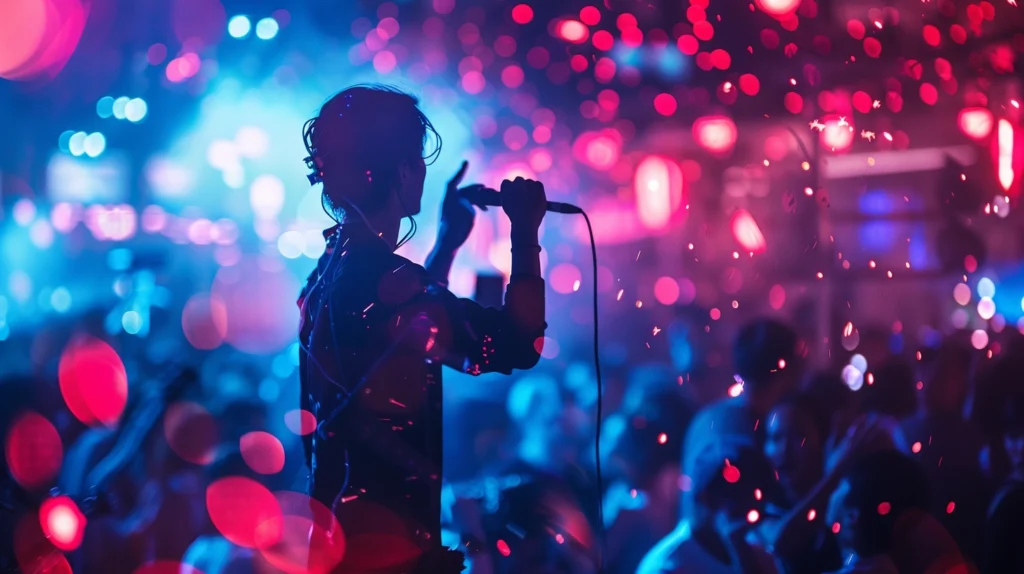
AI for Songwriting
The integration of artificial intelligence (AI) in music production has revolutionized the way music is composed. Today’s AI tools for music production, such as Amper Music and Ecrett Music, empower composers and musicians by simplifying the songwriting process. These innovative tools use machine learning and AI algorithms to generate melodies, harmonies, and rhythms, offering a new avenue to create music.
AI in songwriting proves especially valuable for content creation across platforms like YouTube, where the demand for original music and royalty-free music tracks is high. Songwriters can leverage AI to generate new music swiftly, ensuring they have unique compositions that enhance their videos or game development projects.
- Amper Music: Allows users to specify genre, mood, and length to generate new music tailored to their needs.
- Ecrett Music: Uses AI to create music based on categories specified by the user, simplifying the music creation process for content creators.
The AI music composition process doesn’t replace human creativity but rather amplifies it by removing technical barriers. Composers can input their vision, and the AI can offer possibilities that might not have been considered before.
AI Song Examples
The potential of AI in music composition is best illustrated through successful examples. Sony’s Flow Machines is among the best AI projects, showcasing how AI generates original music in variousstyles. This AI music composer has produced songs that are indistinguishable from those composed by humans, highlighting the advanced capabilities of AI in the music industry.
Another notable example is AIVA (Artificial Intelligence Virtual Artist), an AI trained on thousands of pieces of classical music. AIVA can compose original music for films, video games, and concerts. Its compositions are sophisticated and demonstrate a deep understanding of music theory, showcasing AI’s potential to create new music that evokes emotion and resonates with audiences.
Taryn Southern, a YouTube artist, released an album completely composed by AI, marking a milestone in how AI-generated music can be integrated into mainstream music production. Southern’s use of AI did not only generate unique compositions but also opened up conversations about the future of music and the role of technology in creative industries.
AI in Mixing and Mastering
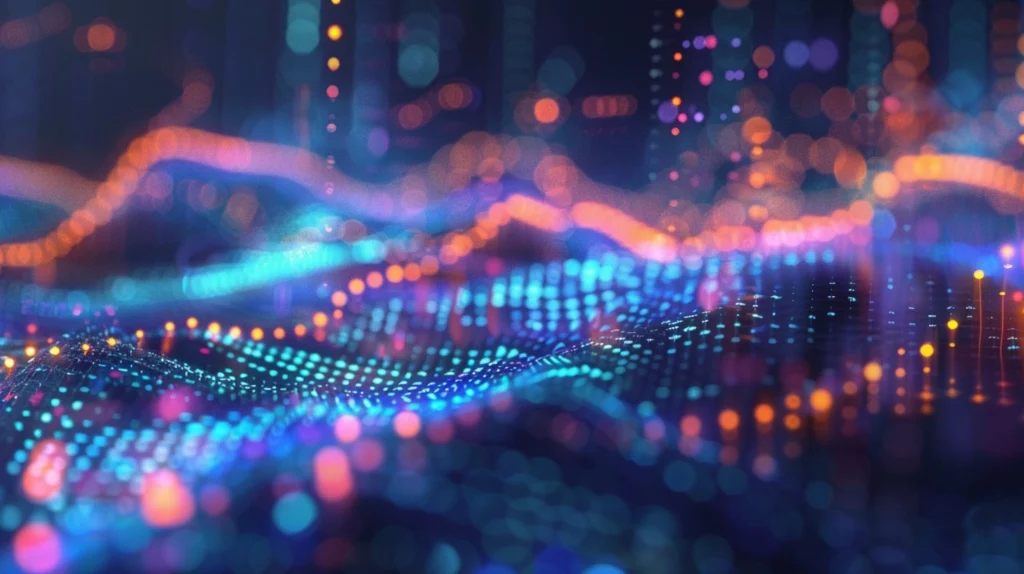
AI in Audio Post-Production
The advent of AI in music production has revolutionized not only how music is composed but also how it’s polished in the post-production phase. AI tools for music production have now extended their capabilities to mixing and mastering, two critical steps that ensure the final track sounds cohesive and professionally produced. These AI-driven platforms use sophisticated algorithms and machine learning to analyze and adjust various elements of a track, including volume levels, equalization, and spatial effects, leading to a balanced and industry-standard product.
For content creation, especially in competitive markets like YouTube and game development, the significance of high-quality audio cannot be understated. Here, AI-driven mixing and mastering tools offer a game-changing advantage. They provide content creators with the ability to achieve professional sound quality without the need for expensive studio time or expertise in audio engineering. This democratization of music production means that creators can focus more on their artistic vision and less on technical barriers.
- Benefits of AI in Audio Post-Production:
- Efficiency: AI tools significantly reduce the time needed for audio post-production.
- Accessibility: These technologies make professional-level mixing and mastering accessible to all creators, regardless of their technical background.
- Consistency: AI can maintain a consistent sound quality across multiple tracks, essential for albums and playlists.
AI’s Sound Quality Impact
The impact of AI on sound quality in music production is profound. By harnessing the power of AI algorithms and neural networks, music production AI tools can analyze thousands of songs to understand and apply the best practices in mixing and mastering across genres. This means AI-generated music can rival or even surpass the quality of tracks mixed and mastered by human professionals. Also, these AI systems continuously learn and improve, ensuring that the music industry benefits from the latest advancements in audio engineering.
Notably, AI in music composition and production doesn’t end with creating original melodies. It extends to enhancing the overall listening experience through superior sound quality. For genres where digital audio quality is paramount, such as electronic dance music or classical orchestration, AI’s precision in adjusting sound levels and effects is invaluable. This precision ensures that every nuance of the music composition is conveyed as intended by the composer, whether it’s the subtle undertones of a symphony or the beat drop in a dance track.
- Tools Leading the Way:
- Amper Music and Ecrett Music are at the forefront of integrating AI in the mixing and mastering phases, providing platforms for creators worldwide.
- These tools not only generate new music but also apply AI’s capabilities in ensuring that the music tracks meet high-quality standards before release.
Copyright Issues and AI-Generated Music
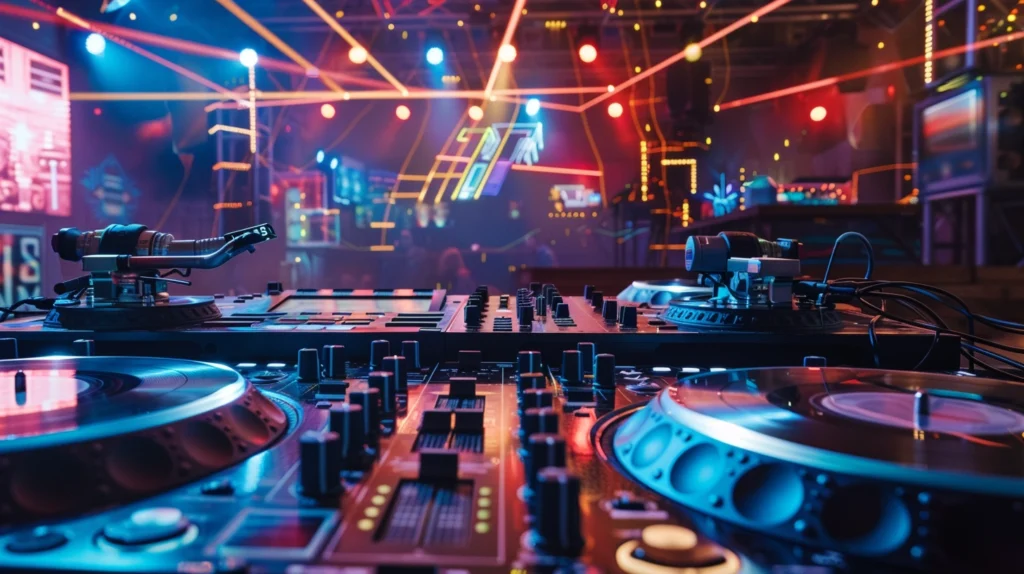
In the rapidly evolving world of music production, the use of artificial intelligence (AI) to create music has sparked a complex debate around copyright issues. As AI music composition and generation tools become more sophisticated, the lines between human creativity and machine output blur, raising questions about originality, ownership, and compensation.
AI Music Copyrights
The core of the discussion on AI-generated music revolves around copyright law. Copyright laws are designed to protect the original works of creators, granting them exclusive rights to use and distribute their creations. But, the integration of AI in music composition introduces a gray area: if a piece of music is created with the help of an AI algorithm, who owns it? The person who designed the AI tool, the user who generated the music, or the AI itself?
Key points to consider:
- AI-generated compositions often involve machine learning models that have been trained on existing music. This raises the question of whether the output can truly be considered original or if it’s derivative.
- 95% of survey respondents emphasize the need for AI developers to disclose the use of copyrighted works in AI training, signaling the demand for transparency.
- Given that AI music generation tools like Amper Music and Ecrett Music provide users with the ability to generate new music, the industry must navigate the challenge of ensuring that AI-created music does not infringe on existing copyrights.
Copyright Case Studies
Several case studies highlight the ongoing challenges in the area of AI and copyright issues:
- Music Composition Lawsuits: Instances where compositions generated by AI tools closely resemble copyrighted tracks, leading to legal battles over originality and copyright infringement.
- AI Model Training: Controversies surrounding the use of copyrighted music to train AI algorithms without proper licenses or compensation to the original creators.
These case studies illustrate the complexity of copyright law in the age of AI music production. As the technology advances, so too must the legal frameworks that govern the creation and use of AI-generated content, ensuring fair compensation and recognition for all involved in the creative process.
In exploring these challenges, stakeholders in the music industry — from composers and musicians to AI developers and legal experts — must collaborate to establish guidelines that foster innovation while respecting copyright norms. This collaborative approach will ensure that AI for music production continues to thrive, enabling new music creation without diminishing the rights and contributions of human creators.
Community Perspectives on AI in Music
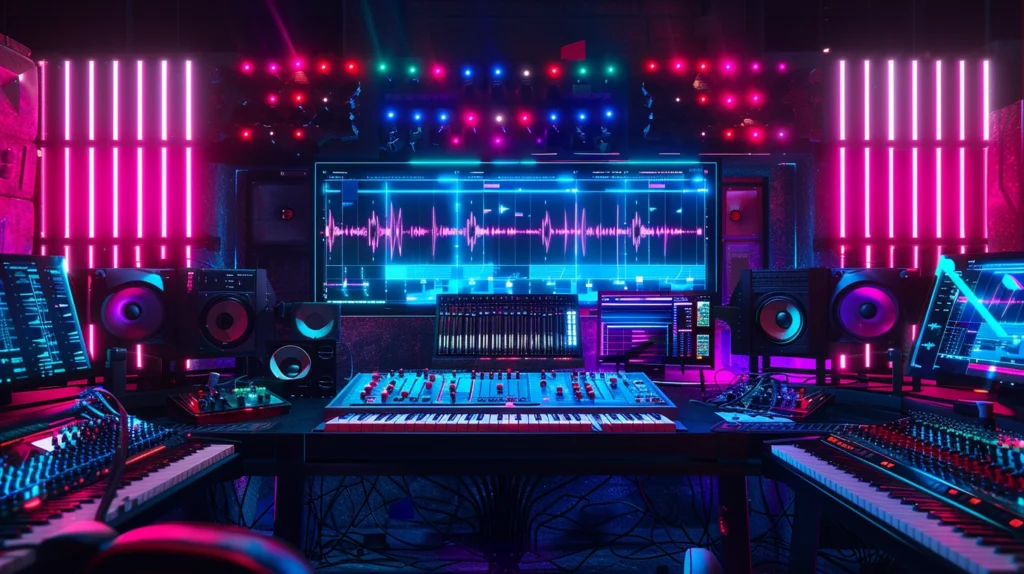
The advent of AI in the music industry has ignited fervent discussions among professionals, enthusiasts, and skeptics alike. With a notable shift towards digitalization, integrating AI for music production has become a polarizing topic, presenting both groundbreaking opportunities and significant challenges.
Producer Community Insights
The music production community is witnessing a transformative phase with the integration of AI tools. A considerable number of musicians and composers have already begun to explore the potential of AI in enhancing creativity and efficiency within their workflows. According to recent surveys:
- 60% of musicians use AI for various music production aspects.
- Among them, 77% would use AI to create album artwork, and 66% for mixing and mastering.
Music producers, in particular, have expressed overwhelming interest in the capabilities of AI. With 86.6% believing that AI production tools will replace some current tools, it’s clear that the industry is leaning towards a more technologically advanced future. This shift is accompanied by a younger demographic of music creators, with 51% under the age of 35 incorporating AI into their creative process, compared to 35% of all ages.
Music producers appreciate the efficiency and new possibilities AI tools bring into music composition, expanding the boundaries of creativity. From generating new melodies to processing complex arrangements, AI facilitates a level of productivity previously unimaginable. Tools like Amper Music and Ecrett Music have become popular among creators for their ability to compose original music and generate new tunes based on specified moods and genres.
AI Usage Concerns
Even though the optimism surrounding AI in music production, there are underlying concerns that cannot be overlooked. Primary among these is the fear of diminished originality and creativity. 29.7% of music producers worry that AI tools may lead to productions that lack the unique touch only a human can provide. This concern reflects a broader debate within the industry on the balance between leveraging AI capabilities and preserving the essence of human creativity in music.
Another critical issue is copyright and ownership. When AI algorithms generate music based on existing music, the lines of originality and copyright infringement blur. This situation demands clear guidelines and regulations to protect creative rights while encouraging innovation.
Besides, there’s a fear among professionals that AI could potentially oversaturate the market with content, making it harder for unique and genuinely creative works to stand out. With AI’s capability to churn out music at a rapid pace, the industry could face challenges in maintaining quality and authenticity.
As the music industry navigates these uncharted waters, it’s crucial for continuous dialogue and collaboration among all stakeholders. By addressing concerns and maximizing the benefits of AI in music production, the community can foster an environment that honors both technological advancement and artistic integrity.
AI and the Future of Music Production
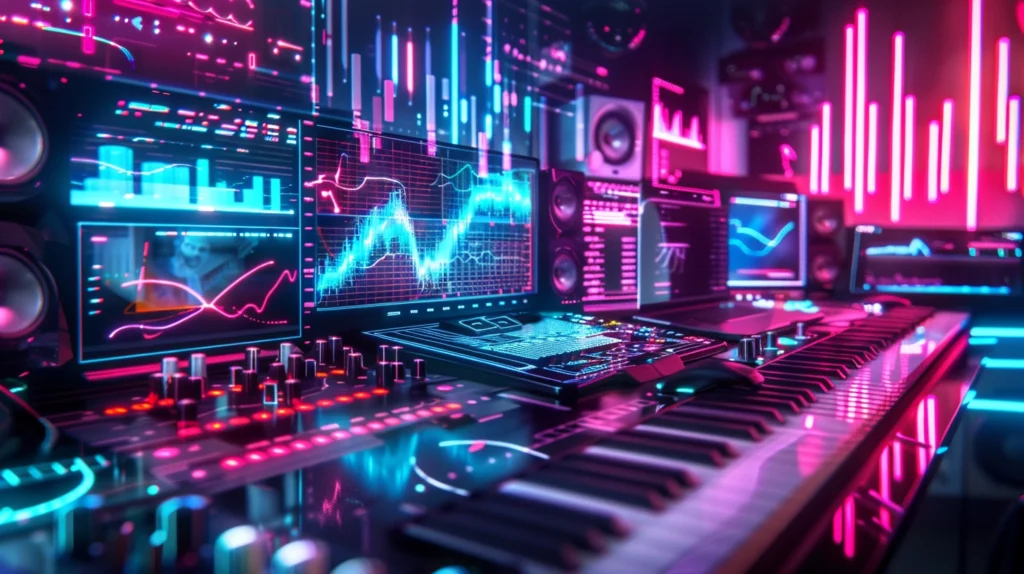
The intersection of artificial intelligence and music production heralds a transformative era in the music industry. AI’s burgeoning role in this domain is not just reshaping how music is created but is also redefining the skill sets required for budding and established music creators alike. As we pivot towards a future where technology and art coalesce more seamlessly, understanding the trajectory of AI in music production becomes imperative.
AI’s Future Role
AI music generation tools are swiftly moving from novelty to necessity, indicating a profound shift in how music could be composed, produced, and distributed in the near future. These AI tools for music production leverage machine learning algorithms to generate music, melodies, or even complete tracks with minimal human input. Notable platforms like Amper Music and Ecrett Music are at the forefront, offering intuitive interfaces for creating background scores or royalty-free music tracks without needing a deep jump into traditional music composition. The growth of AI in this field is backed by a few key developments:
- Machine Learning Advancements: Improved AI models and neural networks capable of analyzing vast datasets of existing music to generate new and original music.
- Accessibility: Making music production more accessible to creators who may lack formal training in music theory.
- Customization: Offering unparalleled customization options, enabling creators to fine-tune generated music according to their specific needs.
By harnessing AI for music production, creators can sharply reduce the time and effort required to produce quality music, allowing for more focus on creative expression and thematic exploration.
AI’s Impact on Music Careers
The integration of AI into music production is a double-edged sword when it comes to its impact on careers within the music industry. On one hand, it democratizes music creation, making it more accessible to a broader range of content creators, including those involved in YouTube video production, game development, and voiceovers, who may not have a musical background. On the other hand, there are legitimate concerns about how AI might affect traditional roles within the industry, such as composers and music producers. Key points to consider include:
- Enhanced Collaboration: AI can serve as a collaborative tool, augmenting the capabilities of human composers and producers. It’s not about replacing these professionals but rather enhancing their workflow and allowing for new forms of expression.
- Skill Evolution: Professionals in the music industry may need to adapt by learning how to use AI tools effectively. The ability to co-create with AI could become a valuable skill.
- Job Transformation: While some roles may evolve or diminish, AI will also create new opportunities in AI tool development, AI music analysis, and digital audio engineering.
Ethical Considerations in AI Music Production
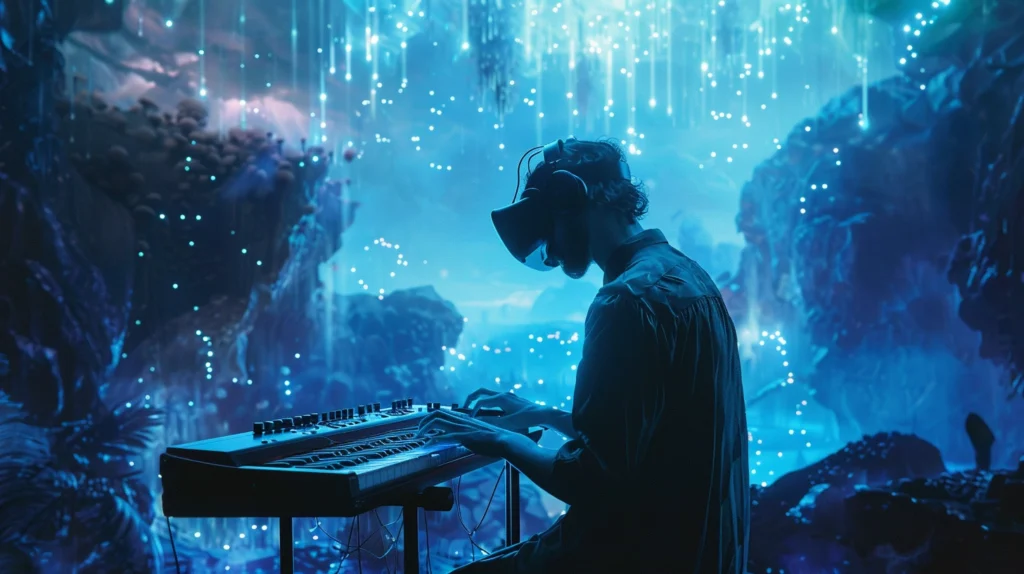
AI Ethics in Music
The integration of AI in music composition and production has sparked a significant ethical debate within the music industry. As AI-generated music becomes more common, questions arise about copyright, originality, and the role of human creativity. One of the key concerns is the potential for AI to generate music based on existing works without proper licensing or acknowledgment, potentially infringing on copyright laws.
- 95% of respondents in a recent survey expressed the desire for AI developers to disclose any use of copyrighted works in training AI models.
- 22% of music producers stated they use AI for mastering their audio tracks, spotlighting the growing reliance on these technologies.
The ethical use of AI in music also touches on the fairness of financial remuneration for creators. As AI can create vast amounts of music quickly and efficiently, determining how and if artists should be compensated for works that AI systems generate using their original music as a basis is imperative.
Creativity vs. AI Assistance
The emergence of AI tools for music production, such as Amper Music and Ecrett Music, challenges traditional notions of authorship and creativity in music. While these tools can generate new music and assist with music composition, they also raise questions about the value of human versus AI-driven creativity.
- 30% of music listening time in 2022 was anticipated to be of AI-generated music, showcasing the increasing consumption and acceptance of such content.
- 60% of musicians are already using AI in some capacity for music production, which demonstrates a shift toward embracing AI as a collaborative partner in the creative process.
The debate often centers around whether AI assistance in creating music enhances the creative process or if it undermines the importance of human ingenuity. Proponents argue that AI can free creators from mundane tasks, allowing them to focus on more innovative aspects of music production. On the other hand, critics worry that overreliance on AI may devalue the uniqueness of human-generated compositions.
This complex interplay between creativity and AI assistance in music production signifies a turning point in how the industry views composition and authorship. As AI continues to evolve, finding a balance that respects both human creativity and the capabilities of AI will be crucial for the future of music production.
AI for Music Production as a Side Hustle
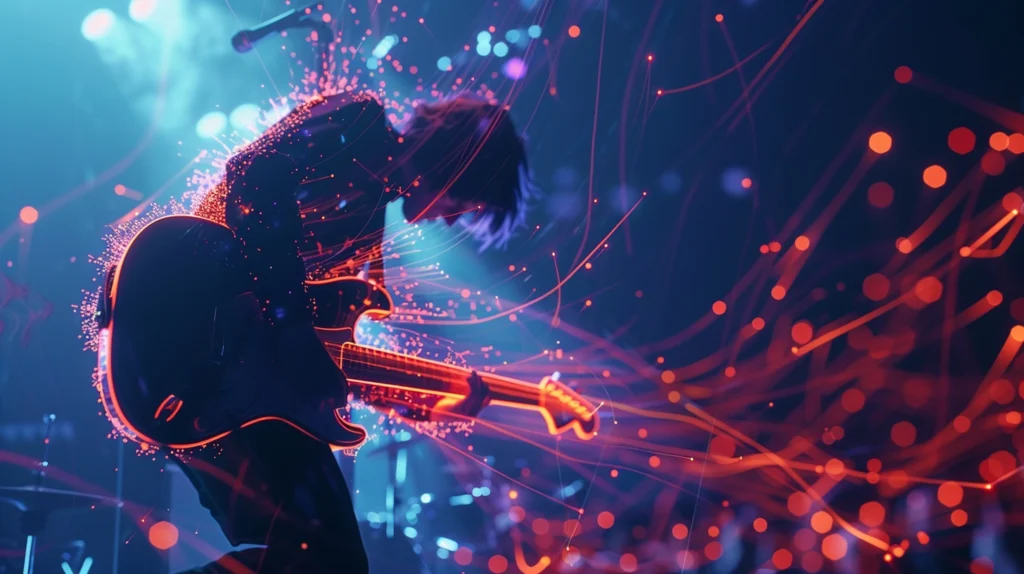
With the revolutionary strides in AI technology, the area of music production has witnessed a transformative shift. For professionals eyeing a side hustle or even newcomers intrigued by the intersection of music and technology, AI for music production offers a fertile ground for exploration and income generation. Here’s a breakdown of the potential avenues:
AI for Stock Music
AI-generated music is carving a niche in the stock music industry, creating royalty-free tracks suited for YouTube, content creation, and game development. Leveraging AI tools like Amper Music and Ecrett Music, creators can generate new music with minimal input, tapping into a vast range of music genres and moods. This capability not only democratizes music production but also opens up a commercial avenue for selling AI-generated tracks on platforms dedicated to royalty-free music.
- Generate diverse music tracks with ease
- Sell on royalty-free platforms
- Broaden access to music for creators globally
AI Music Marketing Tips
Marketing AI-generated music effectively hinges on understanding the digital world and the target audience. Utilizing social media platforms, creating engaging YouTube videos that showcase the creation process, and leveraging SEO strategies can significantly boost visibility. Highlighting the use of AI and the technical prowess behind the music can attract a niche audience interested in the fusion of artificial intelligence and music creation.
- Use social media for promotion
- Create engaging content that highlights the AI process
- Target niche audiences interested in technology and music
AI Production Monetization
Monetizing AI music production involves strategic positioning and tapping into various revenue streams. Beyond selling tracks, composers can explore custom music composition for clients, generate music for podcasts and ads, or offer services for refining and producing AI-generated music. Subscription models or offering exclusive content to Patreon supporters are also viable strategies.
- Provide custom composition services
- Explore podcast and advertising opportunities
- Experiment with subscription models for exclusive content
AI Music Portfolio Building
Building a portfolio that showcases the breadth and depth of AI-generated music capabilities is crucial for attracting clients and opportunities. Incorporating a variety of genres, demonstrating skills in melody and harmony generation, and showcasing AI technology’s versatility in creating both background music and complex compositions can help paint a comprehensive picture of an artist’s or music producer’s abilities.
- Showcase diverse genres and styles
- Highlight technical skills in harmony and melody
- Demonstrate AI’s versatility in music production
In the rapidly evolving world of AI in music production, harnessing AI tools opens up new avenues for creativity, innovation, and income generation. From music creation to marketing, the potential for AI to enhance and streamline processes is immense, offering exciting opportunities for those ready to jump into this cutting-edge conjunction of music and technology.
Frequently Asked Questions
What is AI’s role in music production as a side hustle?
AI offers new opportunities in music production by enabling the creation of AI-generated stock music. This can be used on platforms like YouTube and in game development, opening up innovative avenues for creatives to generate income.
Can AI-generated music be monetized?
Yes, AI-generated music can be monetized. This involves strategic marketing and utilizing platforms that allow for the sale or licensing of stock music. Proper monetization strategies can turn AI-generated music into a profitable side hustle.
Why is it important to have a diverse portfolio of AI-generated music?
Having a diverse portfolio showcases the breadth of AI’s capabilities in music production. It demonstrates versatility and adaptability, attracting a wider range of clients and projects, and thereby increasing potential income opportunities.
How does AI enhance creativity in music production?
AI enhances creativity in music production by removing technical barriers and allowing creators to explore new musical landscapes. It provides tools that stimulate innovation, making it easier to experiment with compositions, generate unique sounds, and push the boundaries of traditional music creation.
What are the best strategies for marketing AI-generated music?
The best strategies include leveraging social media platforms to showcase your work, partnering with content creators in need of stock music, and utilizing online marketplaces dedicated to music licensing. Effective networking and demonstrating the unique capabilities of AI-generated music are key to standing out in the market.
References:
- Novice-AI music co-creation via AI-steering tools for deep generative models. ACM Digital Library.
- A comprehensive survey on deep music generation: Multi-level representations, algorithms, evaluations, and future directions. arXiv.
- The artist in the machine: The world of AI-powered creativity. Google Books.
- AIGC Technology: Reshaping the Future of the Animation Industry. HSET.
- Artificial intelligence in the creative industries: a review. Springer.
